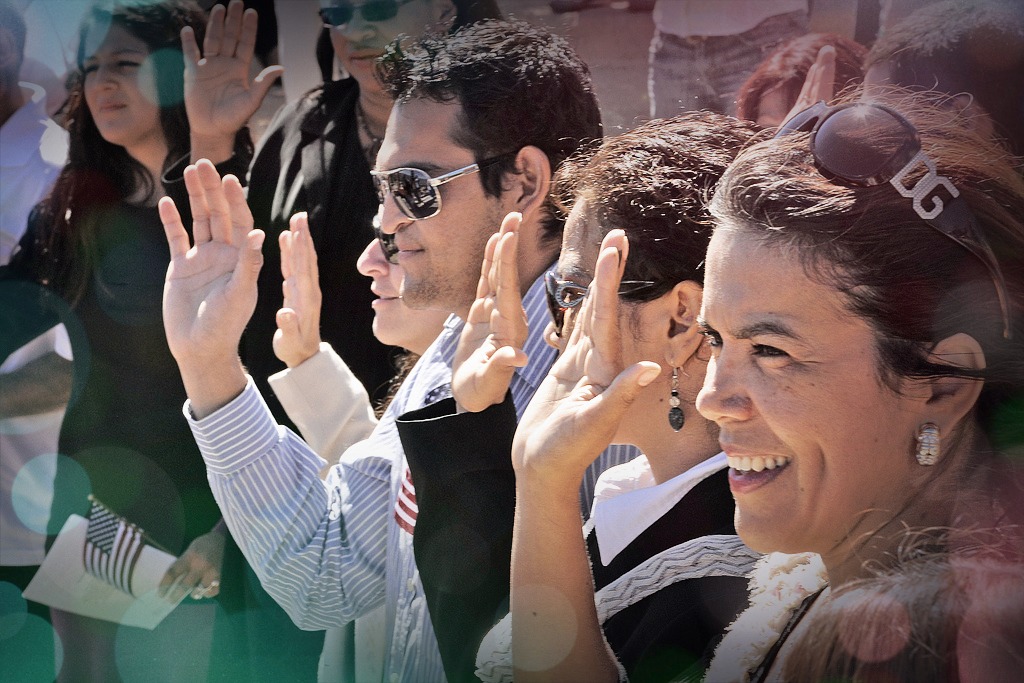
I witnessed my first naturalization ceremony a few weeks ago at the International Festival in Raleigh. Close to 300 people from dozens of different countries became citizens of the United States of America.
Do you know what kind of oath people coming to this country take? I didn’t.
I hereby declare, on oath, that I absolutely and entirely renounce and abjure all allegiance and fidelity to any foreign prince, potentate, state or sovereignty, of whom or which I have heretofore been a subject or citizen; that I will support and defend the Constitution and laws of the United States of America against all enemies, foreign and domestic; that I will bear true faith and allegiance to the same; that I will bear arms on behalf of the United States when required by the law; that I will perform noncombatant service in the armed forces of the United States when required by the law; that I will perform work of national importance under civilian direction when required by the law; and that I take this obligation freely without any mental reservation or purpose of evasion; so help me God.”
The chorus of nearly 300 voices, all in their own native accents, taking this oath filled the Convention Center.
I felt a little strange watching everyone take this oath and it made me wonder what it means to be an American, what it means to become an American. When I read this oath, I get the idea that what it means to be American is to pledge to take up arms on behalf of our nation and our constitution. What it means to become an American means a willingness to defend and defend violently if necessary.
No doubt every person there had a different story of how they came to be an American citizen. Some probably chose to come to America. Some probably looked forward to becoming an American for many years. But some probably had not. Some probably had stories filled with pain and conflict. Some of the people in that room likely never imagined they’d have to leave their homes. In light of this, the forcefulness of the oath and the triumphant language of patriotism in the ceremony seemed out of place.
As a Christian, this oath gave me significant pause. The oath demands total fidelity and allegiance to the United States of America. The oath even includes religious language, asking new citizens to “bear true faith”, with the help of God, to the USA. Becoming an American is a religious experience, pledging one’s own self solely to the United States.
And then the ceremony ended and the convention center exploded in joy. People received their citizenship papers and they hugged and took many excited photos. For many, this moment was years in the making and it had finally come.
That’s when I realized the hesitation I felt during the oath was a sense that could only be felt by someone with the privilege of American birth and citizenship. I’m not so sure the Iraqi, Mexican, Afghani and Somali immigrants had the luxury to stand and debate, or even resist, the strong language of citizenship to which they were required to swear. Coming to America meant life. In many cases, staying may have meant death.
How then should Christians think about the oath of citizenship? What do we say about what it means to be an American?
For me, I’d like for the act of becoming American not to be equated with an oath to take up arms on behalf of the nation. I’m not quite sure what, as a Christian, I’d like to see in its place or what could be in its place, but we do need a redefinition of what it means to become an American. The language of defense in the naturalization oath points to nation that primarily values military strength. What would the oath of a nation that values the strength of its communities more than the strength of its military look like?
This problem, of course, runs much deeper than the oath of citizenship. But, the oath of citizenship is a window into the larger crisis of what it means to be an American. Instead of requiring this oath cloaked in militaristic language of our new citizens, what would it look like for us to be a nation of people promising instead to work to be a place of human flourishing for those who enter our borders?

